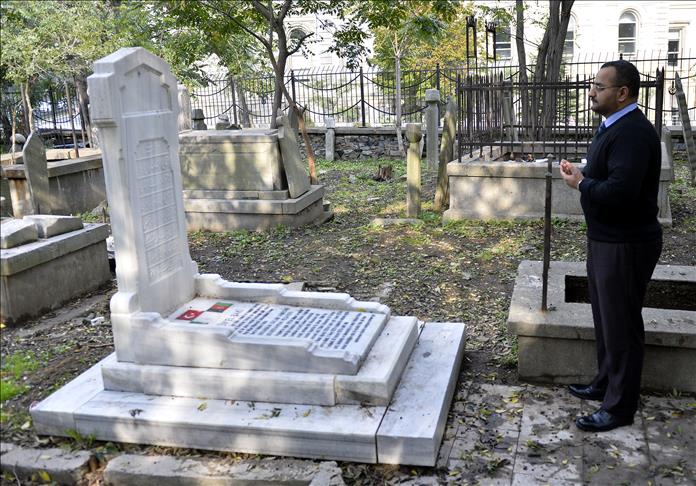
by Burcu Arik
ISTANBUL
During the turbulent days of Turkey's War of Independence, following the defeat of the Ottoman Empire in World War I, an Indian Muslim fled his country to lend a hand to the ailing Ottomans.
He became the first journalist and foreign affairs officer for the Anadolu Agency, Turkey's first and then nascent news outlet.
Abdurrahman Peshawari was born in Peshawar, and was only 26 when he sold his clothes and books to pay for his sea journey -- despite the wishes of his wealthy family who urged him to continue his studies.
Muhammed Omer Riaz is in Turkey to discover the Indian Muslim hero's epic contribution to Turkey's War of Independence.
Riaz is a relative of Abdurrahman Peshawari and a fourth generation descendant of Abdurrahman's Samedani family, which has around 1000 thousand members today.
"I am very proud and happy to be here in Istanbul for the first time, Turkey is a brother Muslim country for us," he told the Anadolu Agency in a visit to his grand granduncle's tomb in Istanbul.
Riaz said he actually knew little about Peshawari before visiting Turkey and his tomb. "I have learned a lot stuff about Abdurrahman which I did not know before," he said.
Peshawari sailed with 26 Indian Muslims in an Italian ship from Mumbai to Istanbul, the capital of the Ottoman Empire, and during the long journey volunteer doctors in the group trained him in first aid.
He was injured three times while fighting at Gallipoli against the British Imperial navy, during which time Ottoman troops managed to repel invading forces from the Dardanelles Strait.
He later joined with an Ottoman Red Crescent group, bringing financial aid from Indian Muslims to purchase medical equipment for the Ottoman armies fighting in the Balkans.
Indian Muslim communities supported the Ottomans during the empire's collapse and Peshawari was a notable member of this group.
The Caliphate Movement was started by Muslim communities as early as 1912 in British Raj-era India, while the Ottomans were fighting in the Balkans.
Many Indian Muslims contributed to the movement either financially or in person.
For example, some wealthy Indians studying medicine in Europe established a field hospital during the battle of Gallipoli.
According to Riaz, Peshawari was motivated by high Islamic ideals when he fought with the Ottoman army.
He said, "my great granduncle fought for Turkey without any hesitation. I think that he had a will to help a Muslim country in such a time when many Muslims were struggling."
Despite his family urging him to return home, he chose to stay after the war while the Turkish Republic was being established in Ankara in the midst of shattered and war-torn Anatolia.
He refused his mother’s pleas to return by saying, "I cannot come back while the Muslim nation is under invasion."
Peshawari joined the Ottoman army and saw active service in Beirut and Gallipoli during World War I.
Riaz noted that, "He fought for the sake of Muslim brotherhood."
Stating that Pashwari believed in Turkey and had played a vital role in Turkey's War of Independence, Riaz said, "Turkey is a very important country because of its strategical location and its history of caliphate. It was very well respected among all the other Muslim countries."
"I believe Turkey can play a very important role among all Muslim countries today as well," he added.
Working alongside the Anadolu Agency's two founders -- famous novelist Halide Edip Adivar and renowned journalist Yunus Nadi Abalioglu -- Abdurrahman Peshawari wrote his news stories in a small office.
He wrote of wartime atrocities, victories and losses and sent them out with only one finger "flying" over a typewriter, according to Yunus Nadi's memoirs.
"It makes me very happy to visit the Anadolu Agency because when I think that my grand granduncle was employed by them, it makes me really proud," Riaz said.
Stating that the Anadolu Agency played an important role during World War I, Riaz added that, "Today, there is a very important role that the Anadolu Agency can play in bringing peace by reporting on issues from struggling Muslim countries."
"It is a pleasure to see the Anadolu Agency to grow as big as it has today, and for it to be the Muslim world's voice all around the world," he continued.
Praising both the Anadolu Agency and the Abdurrahman Peshawari Brotherhood Platform for keeping Peshawari's values alive, Riaz said, "I believe Mucahit Arslan, the president of the platform, has done a great job because I connected to a lot of people regarding Abdurrahman. They found the grave and restored it. What he has done is marvelous."
"The message from my family is that we should all keep in touch. We should all try to share the things we know about Abdurrahman and all these heroes," he added.
Peshawari served the nascent Turkish Republic, appointed by Ataturk as ambassador to Afghanistan until his story ended tragically when he was assassinated in Istanbul in 1925, apparently mistaken for a military commander.
This abrupt end to Peshawari's career meant that he was denied the international fame which many other 20th century reporters found.
Martha Gellhorn, George Orwell, Ernest Hemingway and Walter Cronkite are just some of the names who documented the most terrible conflicts of their time.
However, in Turkey, Peshawari can truly be said to be in a league of his own.
Anadolu Agency website contains only a portion of the news stories offered to subscribers in the AA News Broadcasting System (HAS), and in summarized form. Please contact us for subscription options.

